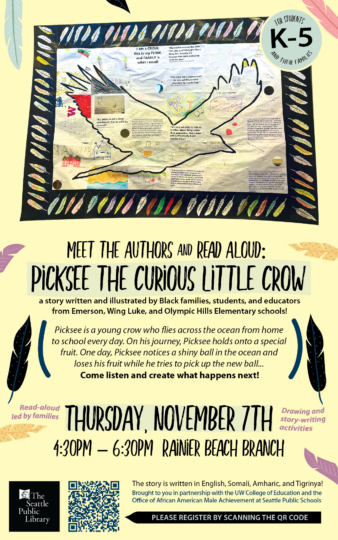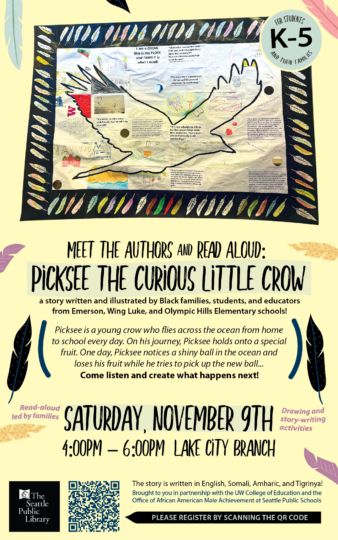
by: Ji Ho (Geo) Yang, PHD Candidate at the University of Washington
This blog post is the first part of a three-part blog series about my experience with the research community practice partnership (RCPP) between the University of Washington’s College of Education and Seattle Public Schools departments of African American Male Achievement (AAMA) via the Early Literacy Collaborative (ELC). This first part is largely a narration of my experiences as part of the RCPP codesign project focused on supporting and engaging in critical literacies with Black families. The first part will include some history of the RCPP, definitions, and dynamics of codesign, and its first year of development. The second part will dig into the beginnings of the first co-design sessions with Black families, students, and SPS educators and leaders. Lastly, the third part will share the celebrations and summative learnings from the first full year of the codesign project, including platforming the amazing work the codesign stakeholders, particularly Black families and students, did during their time with the codesign project.
Before beginning the blog, please check out the authors’ event for the codesign book Picksee: The Curious Little Crow, which will be shared by the codesign families and students on Tuesday, November 7, 4:30 p.m.—6:30 p.m. at the Rainier Beach Branch of Seattle Public Library and Saturday, November 9th, 4:00 p.m.—6:00 p.m. at the Lake City Branch of Seattle Public Library. RSVP here.
A great honor and privilege of my time in Seattle has been participating in a tremendous codesign process with local Black leaders, scholars, and community advocates. More specifically, the codesign collaborative has been a continual partnership between the University of Washington (College of Education), Seattle Public Schools such as with African American Male Achievement-AAMA), community organizations (such as WA-BLOC, National Black Child Development Institute of Seattle), and most importantly with local Black families, youth, and community leaders.
During my time with the partnership, I had the opportunity to support and journey with the Early Literacy Collaborative, an initiative focused on codesigning critical literacy practices with Black families and students and elementary school educators and school leaders. My journey with the codesign project truly began in its early stages, where the vision, philosophy, and approaches were in their infancy, which was the early summer of 2022.
This collaboration did not appear from thin air. The Research Community Practice Partnership (RCPP) began in 2015 across the university and district, and other sectors of the city to focus on supporting educational equity in Seattle. The RCPP started with codesign projects pertaining to creating supports and practices for racial equity teams in the district, and continued on in looking at Black families and justice-focused educators’ experiences during pandemic remote learning. Furthermore, the codesign project on critical literacy practices with Black local stakeholders did not just begin in 2022 but was piloted by SPS’ Office of AAMA and has evolved into the project as it is today. This project was formalized into the Early Literacy Collaborative (ELC). The ELC was made possible through the passion and vision of stakeholders across SPS, UW, community organizations, and school staff such as teachers, principals, and family connectors, to both come together and acknowledge fostering expansive literacies rooted in Black families’ home- and community-based knowledge was only possible with Black families and youths as partners. Historicizing codesign processes is important in denoting the time necessary to authentically engage in codesign (defined in the following paragraph) and particularly for acknowledging the time, energy, and diligence needed to navigate a codesign process.
Codesign is a collaborative process and method emphasizing collective learning through relationships (Vakil et al., 2016; Yamashiro et al., 2023). Codesign requires consistent attention to issues of power. Trust in a partnership engaged in educational codesign is entrenched in power, such as positional or authoritative differences across relationships, personal experiences with institutions, or one’s identity (Vakil et al., 2016). Here, trust is also racialized, meaning trust is tied or imprinted with meanings related to race. Politicized trust is a concept that grounds trust through relationships and power (i.e. trust is inherently power-based). Codesign is predicated on developing relational trust across stakeholders, negotiating values and visions, and consensus building, which all require careful attention to issues of power that stakeholders such as UW researchers, SPS leaders, and educators have in relation to Black families and students. However, a sense of solidarity is not enough. Partnership engaged in codesign requires ongoing building and cultivation of relational trust from the beginning and all throughout the process. Sustaining a community partnership engaged in codesign is heavily based on relationships, and thus trust is a primary vehicle for learning and creating solutions.
One genesis for the ELC is SPS’s 2019-2024 strategic plan, where a key focus is on reading growth, particularly at the 3rd-grade benchmark. The RCPP further specified SPS’s plan on reading growth through the lens of Black literacy in schools and dismantling deficit perspectives and pedagogy pertaining to literacy learning. As we began this project, we started with making sense of what critical literacies for Black elementary boys actually meant as a concept, including what “critical literacy” meant. Our initial learning process included reading studies and narratives about early literacy, critical consciousness development, and Black experiences in education (studies are cited below). Through this process, we identified with the understanding that literacy goes beyond reading, writing, and comprehending text in a school setting. Literacy encompasses all facets of our lives that incorporate language and culture. This definition of literacy includes storytelling, intergenerational learning, the sense of one’s neighborhood, and one’s ties to their home or family culture.
The concept of “critical” relates to how literacy is exercised by students to understand the society they live in. Critical literacy is related to one’s capacity to develop relationships with their community, question everyday life, and read issues of power in their lives. The RCPP further contextualized “critical literacy” by framing it in relation to how Black students are empowered to connect literacy to their community and culture. Centering critical literacy in this project seeks to address anti-blackness in education, where Black culture, languages, and capital are devalued and deprioritized. Pro-Blackness, a direct antithesis to anti-blackness, centers that Black humanity should be celebrated, revered, and respected, including Black culture, languages, capital, needs, and visions/dreams, and became a key conceptual influence for the project (check out works from Kinloch et al., 2020; Roby et al., 2023; Wynter-Hoyte et al., 2022; cited below for more information).
Our early conceptual learning was foundational to our vision and approaches moving forward. From here, we developed an initial team of SPS leaders (Selam Misgano-Housing and Education Partnerships Manager, Dr. Shelby Cooley-Research and Evaluation, Asosa Sailiai-Family Partnership and Family Connector University Coordinator, and others), community organizations, and local educators and leaders. While some ELC stakeholders left over the course of the project, many other stakeholders came on board (including Dr. Sefanit Habtom, who joined the project as a Postdoctoral Scholar and RCPP Manager at the end of year 1).
From the beginning of the project, there was a strong sense of solidarity and vision in supporting and making visible early Black critical literacies. However, the ongoing building and cultivation of politicized trust wasn’t always easy. Bumps in building and cultivating that trust included a lack of clarity on roles, unclear timelines, and shifts in responsibilities. Many of these bumps were unforeseen or related to issues beyond the RCPP’s control, including budget cuts and staff turnover in the district. Challenges and delays are inherent aspects of codesign and education (i.e. messiness in learning and growing together rather than dictating and imparting to others). These bumps served as key reflections and learnings for the RCPP moving forward into its next stage of partnering with families, students, educators, and administrators.
At the end of its first year, the ELC began its official launch in June 2023 at the Northwest African American Museum, where for the first time, Black Seattle families and youth attended. The launch was an opportunity for Black families and youth to gauge the intentions, visions, and approaches of the project we had codesigned so far. The museum was intentionally chosen for its history, significance, and community and provided space for child care, adult engagement, and lunch. It was a joyous, connective, and vibrant event that included storytelling by Elder Dr. Felder, a retired SPS educator and Black community leader who shared experiences of Black joy and literacy. Inspired by Faith Ringgold’s story quilt, families created a collective story quilt by responding to the prompt, “draw a place of joy or learning that matters to your family or community.” Everyone gathered around lunch and made connections with both new and familiar faces. The joy and passion extended from this launch was a product of the year’s planning and codesigning within the RCPP-ELC to launch and begin codesigning with families, students, and educators. Further roadwork needed to be laid before being ready for Black families and youth, and SPS educators to enter the codesign space.
The next post narrates year 2 of the ELC. It shares the process of Black families, students, educators, and administrators entering the codesign process. A key part of this process was the necessary work by the ELC team to form responsive relationships with local stakeholders that are authentic, meaningful to learning, and built on trust.
Please check out the authors’ event of the codesign book “Picksee: The Curious Little Crow” which will be shared by the codesign families and students on Tuesday, November 5th 4:30pm – 6:30pm at the Rainier Beach Branch of Seattle Public Library and Saturday, November 9th 4:00pm – 6:00pm at the Lake City Branch of Seattle Public Library.
Websites (Mostly linked in blog)
https://www.education.uw.edu/pre/early-literacy-collaborative
References (Vakil et al., 2016 linked in blog)
Comber, B., Thomson, P., & Wells, M. (2001). Critical literacy finds a” place”: Writing and social action in a low-income Australian grade 2/3 classroom. The Elementary School Journal, 101(4), 451-464.
Kinloch, V., Penn, C., & Burkhard, T. (2020). Black lives matter: Storying, identities, and counternarratives. Journal of Literacy Research, 52(4), 382-405.
Roby, R. S., Calabrese Barton, A., Tan, E., & Greenberg, D. (2023). Co-making against antiBlackness. Equity & Excellence in Education, 56(3), 450-463.
Souto-Manning, M., & Price-Dennis, D. (2012). Critically redefining and repositioning media texts in early childhood teacher education: What if? and why?. Journal of Early Childhood Teacher Education, 33(4), 304-321.
Vakil, S., McKinney de Royston, M., Suad Nasir, N. I., & Kirshner, B. (2016). Rethinking race and power in design-based research: Reflections from the field. Cognition and Instruction, 34(3), 194-209.
Wynter-Hoyte, K., Braden, E., Boutte, G., Long, S., & Muller, M. (2022). Identifying anti-Blackness and committing to Pro-Blackness in early literacy pedagogy and research: A guide for child care settings, schools, teacher preparation programs, and researchers. Journal of Early Childhood Literacy, 22(4), 565-591.
Yamashiro, K., Wentworth, L., & Kim, M. (2023). Politics at the boundary: Exploring politics in education research-practice partnerships. Educational Policy, 37(1), 3-30.

